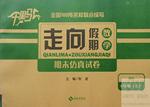题目内容
If Jim’s wife won’t go to the party, _______ .
A.he will either B.neither will he C.he neither will D.either he will
【答案】
B

练习册系列答案
 千里马走向假期期末仿真试卷寒假系列答案
千里马走向假期期末仿真试卷寒假系列答案
相关题目
题目内容
If Jim’s wife won’t go to the party, _______ .
A.he will either B.neither will he C.he neither will D.either he will
B

 千里马走向假期期末仿真试卷寒假系列答案
千里马走向假期期末仿真试卷寒假系列答案